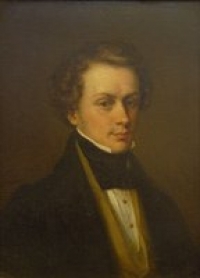Doppler, Christian Andreas
Christian Andreas Doppler (1803-1853), Austrian physicist who first described how the observed frequency of light and sound waves is affected by the relative motion of the source and the detector, a phenomenon now known as the Doppler effect (1842). Doppler postulated that sound waves would have a higher frequency if the source were moving toward the observer and a lower frequency if the source were moving away from the observer. A common example is a train’s whistle that has a higher pitch than normal when the train approaches, and a lower pitch after it passes. The Doppler effect applies to all types of waves, including light. Edwin Hubble, for example, used the Doppler effect to determine that the universe is expanding.
Further Reading
Christian Doppler (christian-doppler.org)
Doppler Biography (University of St. Andrews, Scotland, School of Mathematics and Statistics)
National Doppler Radar Sites (NOAA National Weather Service)
The Doppler Effect (NOAA National Severe Storms Laboratory)
